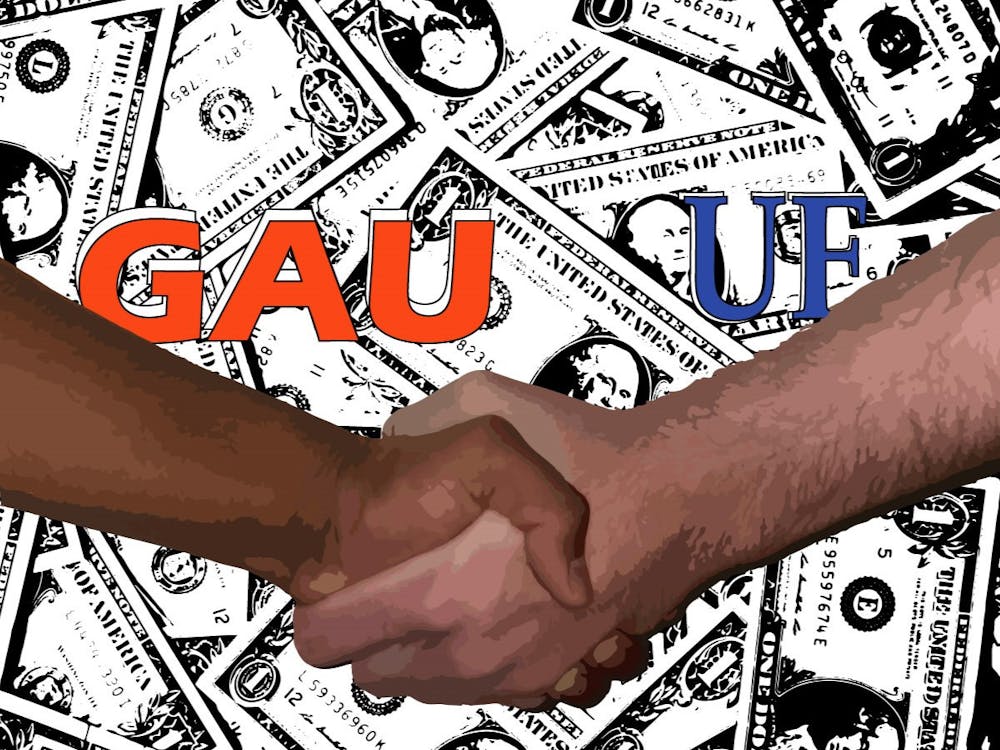Graduate Assistants United’s bargaining sessions with UF are continuing after more than two months since its last session.
Now that there are three negotiation meetings on the calendar, upcoming bargaining sessions hold promise, said Eva Garcia Ferres, GAU’s newest co-president.
Ferres was elected March 24 and will assume Rachel Hartnett’s role, whose term as co-president ends April 15. She’ll work alongside co-president Bryn Taylor.
Ferres, a 26-year-old second-year social psychology graduate assistant, said her new role will be all-encompassing, particularly in the case of bargaining.
Bargaining sessions begin with a meeting in which GAU presents concerns and an outline for change to UF’s bargaining team. UF’s bargaining team can call a caucus during the meeting and go to a separate room for discussion. They often have meetings outside of official bargaining sessions to discuss a counteroffer for GAU, which the UF team then delivers at the next bargaining session.
“I think a lot of people get caught up with the word bargaining,” Ferres said. “But it's just basically negotiation.”
Each bargaining session typically lasts about an hour. Meetings used to be scheduled on a case-by-case basis depending on members of both bargaining teams’ schedules, but with three meetings on the calendar for the next three weeks, Ferres is hopeful about making more progress.
“This is the moment for graduate assistants to stand united and collectively demand protection, better employment and better benefits,” Ferres said.
Rachel Hartnett, GAU’s outgoing co-president, said although the change she sought two years ago was never fully realized during her term, she sees promise in the next wave of bargaining negotiations with UF.
“It's been a struggle, especially over the past few years, because UF has not had a chief bargainer,” Harnett said.
Before Patrick Keegan was hired as UF’s chief bargainer in the Fall, the role didn’t exist. Instead, Ryan Fuller assumed the primary bargaining role. However, Fuller’s role was not limited to being a chief bargainer for UF unions, so his focus was not strictly tied to GAU.
Hartnett, a 35-year-old doctoral candidate in the English department, said Keegan seems dependable. Keegan declined an interview request from The Alligator.
Keegan has started meeting with GAU members outside of negotiations to discuss issues and potential changes for graduate assistants. These informal discussions aren’t part of bargaining sessions, but they help bridge a gap between GAU and UF’s representatives, Hartnett said.
“We're able to work on issues and have open conversations about things that are affecting GAs,” Hartnett said. “Not bargaining-related, but the accessibility of him is a lot better. It just was not possible before that.”
In the past, scheduling and sticking to a timeframe was difficult without a designated chief bargainer, whose sole role was to handle union negotiations. Now, UF and GAU have three negotiations scheduled for April 11, 18 and 25.
The new year kicked off to a rocky start, with one bargaining session held Jan. 30 followed by silence, Hartnett said.
“It’s sort of like playing racketball,” Hartnett said. “You’re playing against a side that doesn’t want to participate.”
Another bargaining session scheduled for March 24 was postponed after GAU’s bargaining chair fell ill. GAU proposed a Zoom bargaining session, which was how negotiations were handled during the coronavirus pandemic, but Hartnett said UF’s bargaining team championed waiting until the team could all meet in person.
GAU is continuing its goal to negotiate Article 10 in its 2021-2023 collective bargaining agreement to raise the minimum stipend for graduate assistants from $17,000 to $38,500.
UF is simultaneously bargaining with the United Faculty of Florida union for higher wages and better benefits for employees. Tom Kelleher, the graduate school representative on UF’s bargaining team, said he champions helping the graduate assistants but works to understand what is feasible.
UF bargainers need to take into account UF’s finances alongside the demands of unions, Kelleher said. Coordinating plans and bargaining sessions among all unions could help create a more equitable balance.
“That's another interesting dimension because the faculty has their own contract,” he said. “I think that might be one of the benefits if we can get the GAU and the faculty in sync.”
A key factor behind UF’s inability to budge on increasing graduate assistants’ stipends is based on budgetary restrictions. Grants, donations and state funds are earmarked for specific purposes, which makes dispersing higher stipends to graduate assistants difficult, Kelleher said.
“I could go in and be like, ‘Sure. Let's double everybody's salary,’” Kelleher said. “But [Keegan’s] the one who is like, ‘Where's this money going to come from?’”
GAU’s next bargaining session with UF is 2 p.m. April 11 at the Reitz Union room 3320.
Contact Sophia at sbailly@alligator.org. Follow her on Twitter @sophia_bailly.

Sophia is The Alligator's Fall 2025 digital managing editor. She previously served as the enterprise editor and university editor, as well as a beat reporter for three semesters. She has also interned for The Times-Picayune and The News & Observer as a politics reporter. Her non-journalistic passions include long-distance running, reading mystery books and listening to Florence + The Machine.






